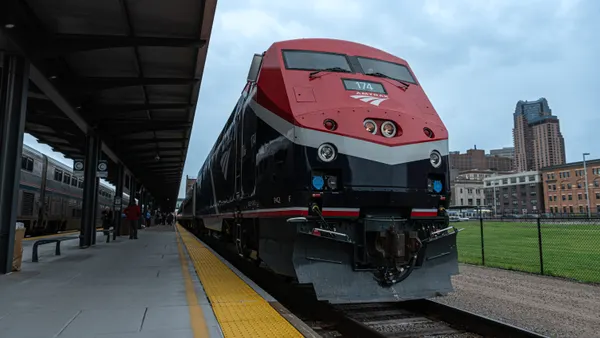Dive Brief:
- Acting Federal Transit Administration (FTA) Administrator K. Jane Williams rejected claims the agency is lagging on the distribution of federal grant money to help local transit agencies pay for new projects, despite accusations from elected officials, advocacy groups and the agencies themselves.
- During a testimony before the House Committee on Transportation and Infrastructure's Subcommittee on Highways and Transit, Williams said the FTA is distributing the Capital Investment Grant (CIG) program funds in accordance with the law. She blamed myriad local issues for preventing the money from flowing into transit projects sooner.
- Committee members were unconvinced. According to data compiled by the committee's Democratic-controlled majority, transit agencies have experienced longer waits for project approvals from FTA. The data also found the FTA is reluctant to share the costs of new projects. "What is happening here? Surely this isn’t deliberate? But then we’re left to believe the administration doesn't know how to handle this program," subcommittee chair Eleanor Holmes Norton, D-DC, said during her opening statement.
Dive Insight:
As cities grow in population and in size, they will become increasingly reliant on public transit to help move new residents around, increasing concern over funding. Norton said that modes of transportation like trains, buses and streetcars need financial backing from all levels of government and the private sector, including through CIG.
"If we are to keep up with this massive growth, we are going to need to make massive investments in transit," she said.
Meanwhile, budget pressures at the local level mean that help from the federal government is even more necessary, especially for major projects. While public-private partnerships (P3s) are growing in popularity, lawmakers said such initiatives should be undertaken primarily with public dollars, as they are for the public good.
The apparent lengthening of FTA's approval processes might dissuade many transit agencies and cities from applying for a CIG grant, especially if their budgets are already stretched thin. Beth Osborne, director of Transportation for America, which has pushed the FTA to increase its approval speed and avoid a "breakdown" in the process, said that could set a dangerous precedent and have a chilling effect on the growth of transit.
"It means that only the wealthiest cities can do these kinds of projects, because basically they're wealthy enough to put up all the money and take the risk that they'll never get reimbursed," Osborne told Smart Cities Dive in an interview before the hearing. "Everyone but the very wealthy cities, they don't have that luxury. They're counting on that federal match, and if it goes away it will be a disaster for them."
The hearing occurred as the FTA and President Trump's administration are under fire for appearing to dramatically reduce the federal government’s role in promoting and supporting public transit, despite the President and his allies in Congress also saying at various times that they favor investing in the nation's infrastructure.
However, it's unclear whether the President will continue funding the CIG program at all. Committee Chair Peter DeFazio, D-OR, noted the Trump administration’s FY 2017, 2018 and 2019 budget proposals suggested eliminating the CIG program altogether, with Congress instead coming together on a bipartisan basis to fully fund the program.
Either way, the administration plans to dramatically reduce grant funds for next year. The FTA only requested $1.5 billion for FY 2020, a 40% reduction from this year’s funding levels of $2.5 billion. Williams said this is based in part on the number of projects the FTA expects to be up for funding in that budget cycle.
The FTA has invested $15 billion in public transportation projects, she said, a number that "clearly shows our willingness to support transit."
DeFazio, who has called for a hike on the federal gas tax to pay for infrastructure repairs, said the administration's budget requests show that it wants to get out of funding public transit altogether, even though it is required to fund CIG grants under the Fixing America's Surface Transportation Act (FAST Act), which expires next year. "Ideology does not supersede the law," he said.












